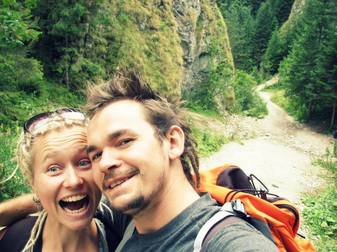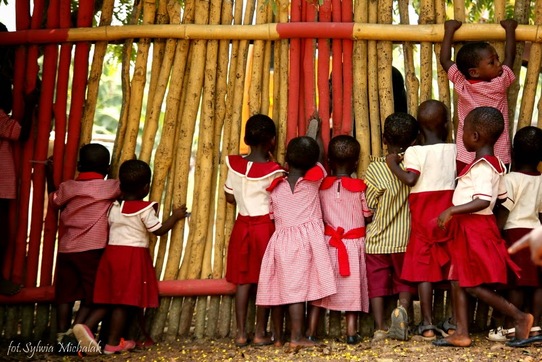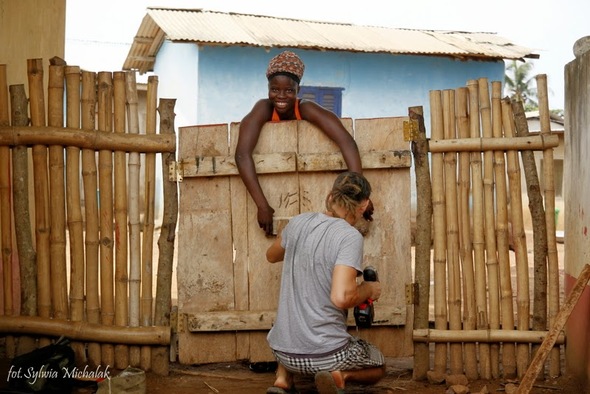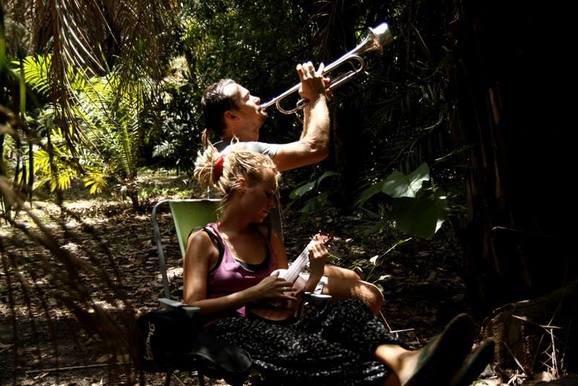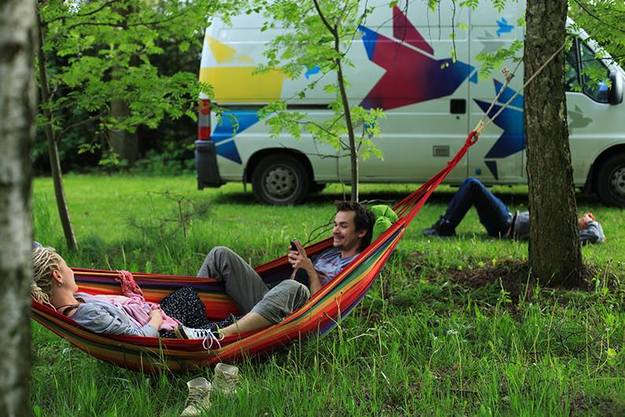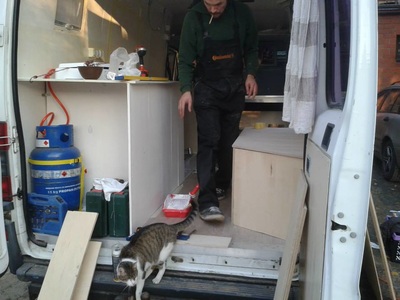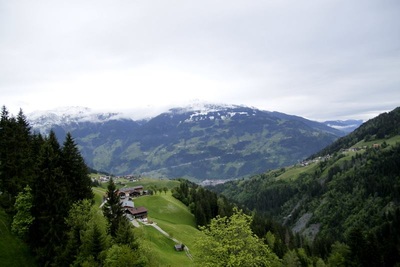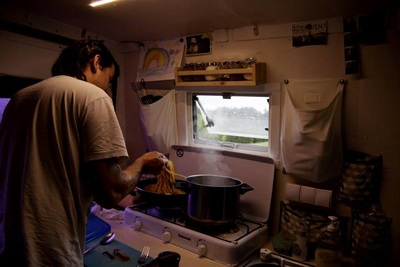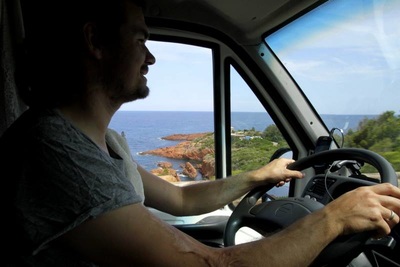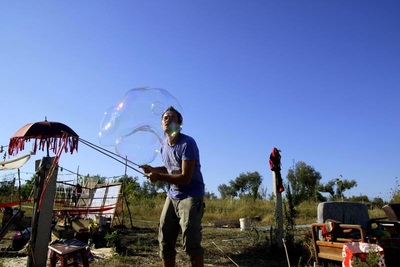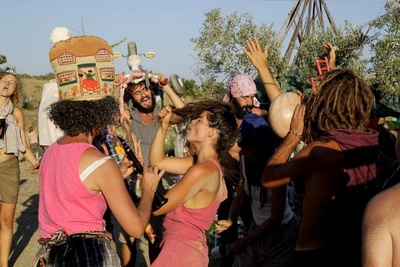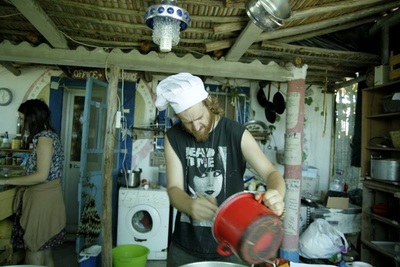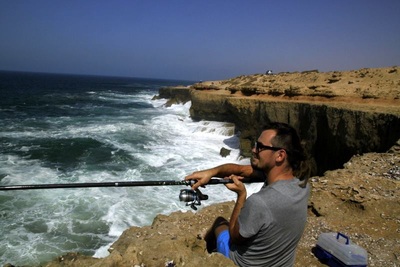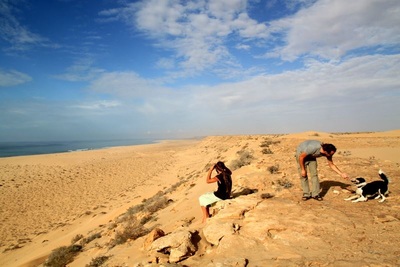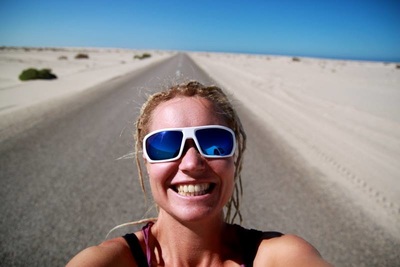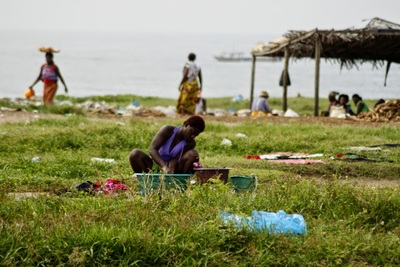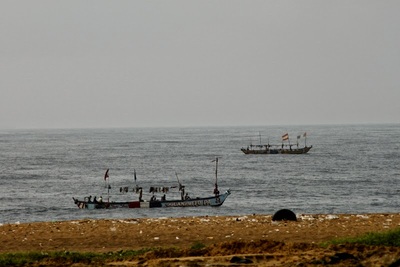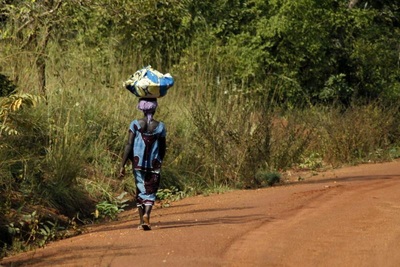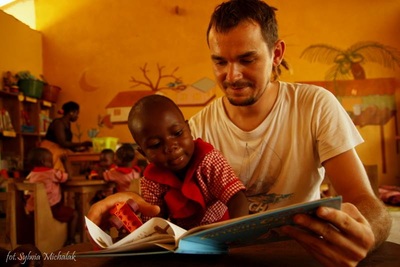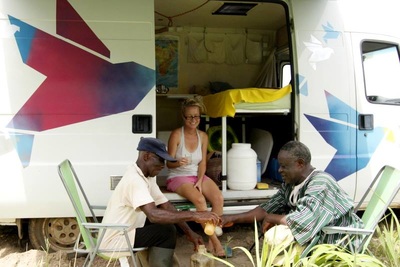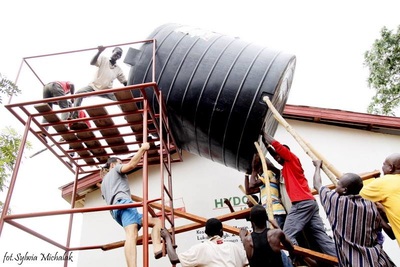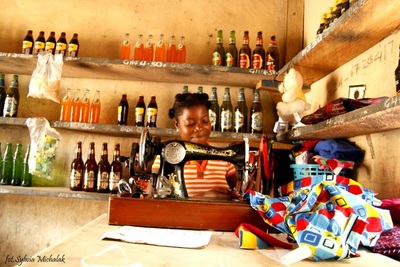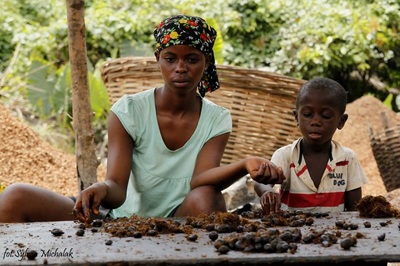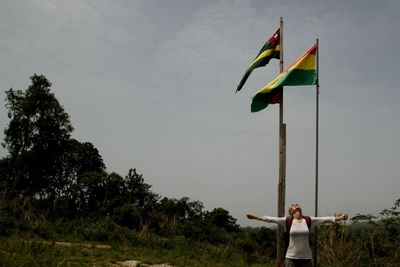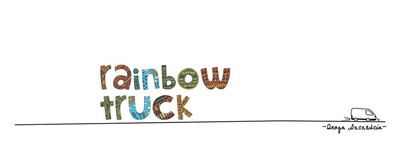Our first interview made by The Happy Magpies, Indie and Charlie. Amazing couple starting their new chapter, living as nomads.
You can fallow them on
The Happy Magpies
INTERVIEW
Rainbow Truck consists of two lovely Polish people Sylwia (34) and Michał (30) who at the moment are discovering the beauty of Africa.
We have first met them in Tribodar eco community, in Portugal during the preparation for the annually organised festival called Tribojam. Since the first moments of our conversation we knew that we are going to follow this incredible couple through their life journey and value their friendship a lot not minding that they are planning to be in a different continent.
Here are their insights about people, love, faith, Africa, relationships, themselves and God:
What are your main lessons after travelling as a couple in a van for a whole year?
Travelling as a couple was a good opportunity to get to know each other better. We were married just for one year before we started living on the road. And before that year chapter we have seen each other only on weekends during three month period of activities such as: cooking meals for (usually homeless) people (''Food not bombs'') or looking after dogs who are in animal shelters. After six weeks as a couple we decided to get married and start planning our trip to Africa. So as you can imagine it was crazy and super quick decision of two incredibly in love people.
The first months we were learning how to fit in a small car together. We were trying to adjust to the new situation, to create a family with actually no good examples from our own homes of how good and healthy marriage should look like. It was a big challenge: no friends around, just two of us trying to understand the depth of the human mind, behavior, differences; ourselves and one another.
After a year we are still on the way, still a lot to learn but we are much stronger as a couple. We are more like one engine – not separate parts.
It was important to understand that it is alright to be weak, to love weak parts of yourself, to accept and actually love pretty much everything. The more love and acceptance we give to one another – less and less place remains for rejection.
The main lesson? Forgive fast, say sorry even faster.
What adventures have you experienced while driving through Europe?
Europe was just the beginning so each day was an adventure. We were like children trying to find ourselves in a new condition. Everything was exciting: the beauty of different landscapes, different languages and different people.
Waking up under Mont Blanc, by the rivers, by the sea… The beauty was in those simple moments. Few things for sure will stay in our memory. Germany, Switzerland and Portugal were the most memorable countries. In Germany and Switzerland, except breaking and miraculously fixing the car, we experienced huge portion of help, love and unexpected financial blessings.
In Portugal we visited Mount of Oaks - a beautiful farm run by two amazing women who live peacefully surrounded by nature and animals. We stayed there for a few weeks helping to build the little shade summer house, enjoying the company and beauty of Portugal.
Tribojam festival was another amazing experience where we spend a few weeks helping and being part of a big festival family. There we have met you guys, so it is definitely worth remembering.
Portugal is quite different than the rest of Europe. It was a good preparation of what we were going to experience stepping into completely different reality.
We have first met them in Tribodar eco community, in Portugal during the preparation for the annually organised festival called Tribojam. Since the first moments of our conversation we knew that we are going to follow this incredible couple through their life journey and value their friendship a lot not minding that they are planning to be in a different continent.
Here are their insights about people, love, faith, Africa, relationships, themselves and God:
What are your main lessons after travelling as a couple in a van for a whole year?
Travelling as a couple was a good opportunity to get to know each other better. We were married just for one year before we started living on the road. And before that year chapter we have seen each other only on weekends during three month period of activities such as: cooking meals for (usually homeless) people (''Food not bombs'') or looking after dogs who are in animal shelters. After six weeks as a couple we decided to get married and start planning our trip to Africa. So as you can imagine it was crazy and super quick decision of two incredibly in love people.
The first months we were learning how to fit in a small car together. We were trying to adjust to the new situation, to create a family with actually no good examples from our own homes of how good and healthy marriage should look like. It was a big challenge: no friends around, just two of us trying to understand the depth of the human mind, behavior, differences; ourselves and one another.
After a year we are still on the way, still a lot to learn but we are much stronger as a couple. We are more like one engine – not separate parts.
It was important to understand that it is alright to be weak, to love weak parts of yourself, to accept and actually love pretty much everything. The more love and acceptance we give to one another – less and less place remains for rejection.
The main lesson? Forgive fast, say sorry even faster.
What adventures have you experienced while driving through Europe?
Europe was just the beginning so each day was an adventure. We were like children trying to find ourselves in a new condition. Everything was exciting: the beauty of different landscapes, different languages and different people.
Waking up under Mont Blanc, by the rivers, by the sea… The beauty was in those simple moments. Few things for sure will stay in our memory. Germany, Switzerland and Portugal were the most memorable countries. In Germany and Switzerland, except breaking and miraculously fixing the car, we experienced huge portion of help, love and unexpected financial blessings.
In Portugal we visited Mount of Oaks - a beautiful farm run by two amazing women who live peacefully surrounded by nature and animals. We stayed there for a few weeks helping to build the little shade summer house, enjoying the company and beauty of Portugal.
Tribojam festival was another amazing experience where we spend a few weeks helping and being part of a big festival family. There we have met you guys, so it is definitely worth remembering.
Portugal is quite different than the rest of Europe. It was a good preparation of what we were going to experience stepping into completely different reality.
What do you think about today’s modern world? What has inspired your decision to start living as nomads?
The world has too many aspects: its beauty and tragedies. There are rich and there are poor. Everyone is different. Everyone has different goals in life. If somebody wants to work hard to buy a flat and pay his debts for the next 30 years – that’s fine. If somebody wants to work for a big corporation and feels good in the office – why not.
Civilization, development, growth has its good and bad sides. As long as we keep the balance, respect the Earth and people around us, have a choice either to live in a big developed city or on the farm growing our own food that’s ok.
I will never say that money is bad, it isn’t. In this world we need it and I think it is impossible to live without it. So I was always grateful for my job and now for each penny that comes to my bank account. Money is ok till you know how to use it, if you have healthy attitude towards it and you don’t put it in the first place.
Before we left to travel we have lived in Warsaw, the capital city of Poland. I always tried to work the best I could even though I knew it is not really for me. I knew that there must be something more that I want to see, experience, feel, touch. Maybe one day we will come back and start working and earning money again in the way that most people do. But we will be richer than before. Richer of memories and experiences which you cannot buy.
The modern world got a bit crazy. We produce more than we need. We grow more food than we can eat. We buy things we don’t use and stack them in cupboards. The rhythm of life seems getting faster and faster. Of course it is only my limited observation. Nothing is sure any more. Life is too short here on earth. That’s why we want to live our dreams, to give it a try. Maybe just for a moment. But it will be our moment.
Inspiration? God. He is the One. Without Him we would have never live the way we always wanted. Even though that lifestyle might seem crazy, irresponsible or against all well-known rules.
What were you both doing before you bought a van and started travelling?
Michał was an electrician, running his little company, being his own boss. I had a few jobs before but the last two years I worked as an accountant/event manager, which means putting all small details together so that the client (mostly big companies) were happy and satisfied according to different types of advertisement, trainings or big events. There were times when it was challenging, working under time pressure with no place for mistake. But mostly it was ok and not boring. Most of the time I worked at home using laptop and my phone so life wasn’t difficult for us. We both have spent a lot of time together enjoying our beautiful apartment with big garden, trees, lots of birds and two lovely cats around. But we changed that for a seven square meters, for an unpredictable life full of surprises.
The world has too many aspects: its beauty and tragedies. There are rich and there are poor. Everyone is different. Everyone has different goals in life. If somebody wants to work hard to buy a flat and pay his debts for the next 30 years – that’s fine. If somebody wants to work for a big corporation and feels good in the office – why not.
Civilization, development, growth has its good and bad sides. As long as we keep the balance, respect the Earth and people around us, have a choice either to live in a big developed city or on the farm growing our own food that’s ok.
I will never say that money is bad, it isn’t. In this world we need it and I think it is impossible to live without it. So I was always grateful for my job and now for each penny that comes to my bank account. Money is ok till you know how to use it, if you have healthy attitude towards it and you don’t put it in the first place.
Before we left to travel we have lived in Warsaw, the capital city of Poland. I always tried to work the best I could even though I knew it is not really for me. I knew that there must be something more that I want to see, experience, feel, touch. Maybe one day we will come back and start working and earning money again in the way that most people do. But we will be richer than before. Richer of memories and experiences which you cannot buy.
The modern world got a bit crazy. We produce more than we need. We grow more food than we can eat. We buy things we don’t use and stack them in cupboards. The rhythm of life seems getting faster and faster. Of course it is only my limited observation. Nothing is sure any more. Life is too short here on earth. That’s why we want to live our dreams, to give it a try. Maybe just for a moment. But it will be our moment.
Inspiration? God. He is the One. Without Him we would have never live the way we always wanted. Even though that lifestyle might seem crazy, irresponsible or against all well-known rules.
What were you both doing before you bought a van and started travelling?
Michał was an electrician, running his little company, being his own boss. I had a few jobs before but the last two years I worked as an accountant/event manager, which means putting all small details together so that the client (mostly big companies) were happy and satisfied according to different types of advertisement, trainings or big events. There were times when it was challenging, working under time pressure with no place for mistake. But mostly it was ok and not boring. Most of the time I worked at home using laptop and my phone so life wasn’t difficult for us. We both have spent a lot of time together enjoying our beautiful apartment with big garden, trees, lots of birds and two lovely cats around. But we changed that for a seven square meters, for an unpredictable life full of surprises.
Why have you chosen Africa to be your main spot of settlement at the moment?
Over the last 10 years Africa was always in my heart. I don’t know why. I knew nothing about this continent. Every time I saw photos, heard some stories my heart was jumping up and down. A very strange and kind of longing feeling appeared. Unfortunately it seemed too difficult, too far away, and too unreal to become reality. I tried to search some opportunities to go on my own but nothing worked out. Now I know why. I was waiting for my dream team to start the journey, the new chapter of my life. My husband appeared. He was the one. He always wanted to have a caravan and travel. I wanted Africa. We fell in love immediately with each other and with our dreams. Everything matched. Straight after the wedding we bought the car. The whole year we worked to adjust the van for it to be a little home inside. And here we are. Over a year on the road thousands of kilometers behind.
What kind of Africa lives in your memory? I expect it to be completely different from what mainstream media is pushing us to believe and what movies about the continent are being sponsored.
Somehow it feels like just the beginning of our African adventure. It’s not even the half of the way so the image is being constantly created. But yes, it is different of what we heard or expected. People are afraid of unknown. Because of bad news and movies, Africa for many is not a good place to live in. Part of that is for sure true. There are wars, there is hunger, and there are diseases. But to see it we don’t have to go to Africa. Till now we haven’t experienced that yet. And probably we’ll never do. We don’t want to go to war, that’s obvious. But Africa is huge. And big part of it is safe, peaceful and very beautiful. And to be clear we do not spend time in big touristic cities and we do not sleep in hotels with European food and standards. We sleep in a car. We spend time in small villages, tiny towns, nature. We eat local food. We talk to average people. We buy products in a market. We drink local beer. No, it is not dangerous. People are happy. They welcome you with open arms. They share food with you, invite you to their homes, their families. They will look after you. They will make sure you are ok. They will bring you food when you are far away from the village or water to bath in the morning. This is the behavior that I don’t see in Europe. Probably there is no need for it because we are so independent and self-sufficient. The simplicity of being good to strangers and paying attention to the needs of others is something what melts my heart. Like everywhere you have good and bad fellows. One wants to be your friend, another looks at you as a bag of money. ’’You are white, you are rich, you should give’’, they must think.
You should be wise and have a bit of common sense concerning avoiding dangerous diseases. Mainstream media exaggerate some of the cases a bit. Even though you can get malaria – in each pharmacy you can get some cheap medicine. It is dangerous but easy to cure. Three days of therapy and you are ok. You don’t have to poison yourself with expensive European chemicals every day as the specialists in Poland say. You can get sick, get robbed, get killed everywhere. It doesn’t have to be Africa.
Over the last 10 years Africa was always in my heart. I don’t know why. I knew nothing about this continent. Every time I saw photos, heard some stories my heart was jumping up and down. A very strange and kind of longing feeling appeared. Unfortunately it seemed too difficult, too far away, and too unreal to become reality. I tried to search some opportunities to go on my own but nothing worked out. Now I know why. I was waiting for my dream team to start the journey, the new chapter of my life. My husband appeared. He was the one. He always wanted to have a caravan and travel. I wanted Africa. We fell in love immediately with each other and with our dreams. Everything matched. Straight after the wedding we bought the car. The whole year we worked to adjust the van for it to be a little home inside. And here we are. Over a year on the road thousands of kilometers behind.
What kind of Africa lives in your memory? I expect it to be completely different from what mainstream media is pushing us to believe and what movies about the continent are being sponsored.
Somehow it feels like just the beginning of our African adventure. It’s not even the half of the way so the image is being constantly created. But yes, it is different of what we heard or expected. People are afraid of unknown. Because of bad news and movies, Africa for many is not a good place to live in. Part of that is for sure true. There are wars, there is hunger, and there are diseases. But to see it we don’t have to go to Africa. Till now we haven’t experienced that yet. And probably we’ll never do. We don’t want to go to war, that’s obvious. But Africa is huge. And big part of it is safe, peaceful and very beautiful. And to be clear we do not spend time in big touristic cities and we do not sleep in hotels with European food and standards. We sleep in a car. We spend time in small villages, tiny towns, nature. We eat local food. We talk to average people. We buy products in a market. We drink local beer. No, it is not dangerous. People are happy. They welcome you with open arms. They share food with you, invite you to their homes, their families. They will look after you. They will make sure you are ok. They will bring you food when you are far away from the village or water to bath in the morning. This is the behavior that I don’t see in Europe. Probably there is no need for it because we are so independent and self-sufficient. The simplicity of being good to strangers and paying attention to the needs of others is something what melts my heart. Like everywhere you have good and bad fellows. One wants to be your friend, another looks at you as a bag of money. ’’You are white, you are rich, you should give’’, they must think.
You should be wise and have a bit of common sense concerning avoiding dangerous diseases. Mainstream media exaggerate some of the cases a bit. Even though you can get malaria – in each pharmacy you can get some cheap medicine. It is dangerous but easy to cure. Three days of therapy and you are ok. You don’t have to poison yourself with expensive European chemicals every day as the specialists in Poland say. You can get sick, get robbed, get killed everywhere. It doesn’t have to be Africa.
What have you learned so far while exploring completely different mentality, set of traditions and culture?
Africa is such a different world with their own ways of cooking, bringing up children, working; different attitudes towards animals, nature, family, strangers.
We have European minds so no matter how hard we would try we actually are different and will not understand everything. Maybe after twenty years but not now..
Something what we have noticed as a big problem before is not as rooted here. We become more and more flexible, patient, and open for others. Seeing differences in people and in their lifestyles helps me to get rid of stereotypes and disturbing walls in my head. I respect life more. I appreciate everything I have. I am happy that I was born where I was born. I am happy for the family I have. From the distance I value my background more than ever before.
Besides being more open and flexible I am learning to set my limitations, to be able to say enough is enough, to mark my private zone. Privacy in Africa is not so obvious so I am learning how to show mine in order to remain calm.
How do you sustain yourselves? Do you agree with the statement: ’’universe/God provides’’, have you experienced it yourselves?
Even though we had just one thousand Euros in our packets we didn’t give up on our decision to go. The only reason we were not afraid and believed that it will be ok was God. Without Him we would have never left. We trust and expect His provision, protection, leading and showing the path. A year on the way and except two little one day jobs we’ve never worked for money. We haven’t even looked for it. It is not that we don’t want to work for money, it is just haven’t happened on our way.
For whole year we were never hungry, have never had lack of money for visas, which are very expensive (each costs 50 Euros). We always have money for petrol and we have some to even share with others. We always think carefully who we should help financially. But all in all, we are very blessed. People send money to our bank account; they want us to keep going. We do believe that it is God who supports us by using different people. Why people? I don’t know. It is important though not to keep the blessing just for yourself. That’s why whatever we get we take some part of it and we bless somebody else. Let the blessing flow. Don’t stop it.
In Switzerland we experienced such a huge financial overflow. It was just the beginning of the journey and already the car has broke down. It was very serious. No chance to go to Africa. A man who never saw us, without any hesitation decided to help us. He fixed the car, paid for everything. He gave us a three floor house to live in and a car while ours was being repaired. He gave us so much money that it was enough for the rest of the trip in Europe. He was not the only one. Other people from Switzerland gave us money too. We were so blessed that for the first time I was crying because it was almost too much help for us. It was like a movie. We were so touched by goodness of God. We felt that we are not alone in here.
How to receive was the first important lesson, what in my case was not so obvious.
I am still learning it. I always thought I have to do something back. I have to earn for that. Now I know we have to accept the goodness from others, the goodness from God. For free, just like that. We have to receive to be able to give, to share, to help. It must be deeply written in our hearts. You must be full so the love for others will overflow from you.
We experience God’s protection everyday in small details. Driving in Portugal in the middle of nowhere Michał heard God’s voice in His heart and mind, saying “there is one broken piece under the car but I am holding it right now so you can keep driving. In the first village I will let it go but there will be a place to buy new parts”. Guess what happened. The part fell down on the street in the first village we were driving past. We stopped, took it and noticed that on the opposite side of the road there was a shop with the needed necessary pieces.
Before going to the dessert God told me: “don’t worry, I will give you water on the dessert, you will be ok”. What happened? The tanks were empty. In Sahara there isn’t many villages. The one we drove by couldn’t give us anything. A person from gas station wanted to give just one bottle and we were desperate for 140 liters to be ok for the next few days. We kept driving and saw an old, empty, destroyed gas station. “Let us stop here”, I said. “No, we won’t find water here”, replied Michał. “Let’s try. Let’s bless this place and pray for water”. Guess what? All the taps were destroyed except one. And there was water. We took as much as we wanted. It was enough for the whole West Sahara. So…that’s how it is. We are still ok, we have more stories to tell, still alive, facing new challenges but believing it will all be ok.
Africa is such a different world with their own ways of cooking, bringing up children, working; different attitudes towards animals, nature, family, strangers.
We have European minds so no matter how hard we would try we actually are different and will not understand everything. Maybe after twenty years but not now..
Something what we have noticed as a big problem before is not as rooted here. We become more and more flexible, patient, and open for others. Seeing differences in people and in their lifestyles helps me to get rid of stereotypes and disturbing walls in my head. I respect life more. I appreciate everything I have. I am happy that I was born where I was born. I am happy for the family I have. From the distance I value my background more than ever before.
Besides being more open and flexible I am learning to set my limitations, to be able to say enough is enough, to mark my private zone. Privacy in Africa is not so obvious so I am learning how to show mine in order to remain calm.
How do you sustain yourselves? Do you agree with the statement: ’’universe/God provides’’, have you experienced it yourselves?
Even though we had just one thousand Euros in our packets we didn’t give up on our decision to go. The only reason we were not afraid and believed that it will be ok was God. Without Him we would have never left. We trust and expect His provision, protection, leading and showing the path. A year on the way and except two little one day jobs we’ve never worked for money. We haven’t even looked for it. It is not that we don’t want to work for money, it is just haven’t happened on our way.
For whole year we were never hungry, have never had lack of money for visas, which are very expensive (each costs 50 Euros). We always have money for petrol and we have some to even share with others. We always think carefully who we should help financially. But all in all, we are very blessed. People send money to our bank account; they want us to keep going. We do believe that it is God who supports us by using different people. Why people? I don’t know. It is important though not to keep the blessing just for yourself. That’s why whatever we get we take some part of it and we bless somebody else. Let the blessing flow. Don’t stop it.
In Switzerland we experienced such a huge financial overflow. It was just the beginning of the journey and already the car has broke down. It was very serious. No chance to go to Africa. A man who never saw us, without any hesitation decided to help us. He fixed the car, paid for everything. He gave us a three floor house to live in and a car while ours was being repaired. He gave us so much money that it was enough for the rest of the trip in Europe. He was not the only one. Other people from Switzerland gave us money too. We were so blessed that for the first time I was crying because it was almost too much help for us. It was like a movie. We were so touched by goodness of God. We felt that we are not alone in here.
How to receive was the first important lesson, what in my case was not so obvious.
I am still learning it. I always thought I have to do something back. I have to earn for that. Now I know we have to accept the goodness from others, the goodness from God. For free, just like that. We have to receive to be able to give, to share, to help. It must be deeply written in our hearts. You must be full so the love for others will overflow from you.
We experience God’s protection everyday in small details. Driving in Portugal in the middle of nowhere Michał heard God’s voice in His heart and mind, saying “there is one broken piece under the car but I am holding it right now so you can keep driving. In the first village I will let it go but there will be a place to buy new parts”. Guess what happened. The part fell down on the street in the first village we were driving past. We stopped, took it and noticed that on the opposite side of the road there was a shop with the needed necessary pieces.
Before going to the dessert God told me: “don’t worry, I will give you water on the dessert, you will be ok”. What happened? The tanks were empty. In Sahara there isn’t many villages. The one we drove by couldn’t give us anything. A person from gas station wanted to give just one bottle and we were desperate for 140 liters to be ok for the next few days. We kept driving and saw an old, empty, destroyed gas station. “Let us stop here”, I said. “No, we won’t find water here”, replied Michał. “Let’s try. Let’s bless this place and pray for water”. Guess what? All the taps were destroyed except one. And there was water. We took as much as we wanted. It was enough for the whole West Sahara. So…that’s how it is. We are still ok, we have more stories to tell, still alive, facing new challenges but believing it will all be ok.
What about the bureaucracy of visas, permissions, other type of documents? Did you have any difficulties with that?
On the borders you need to have a lot of patience. A few times we had to spend the night while waiting for all the documents to enter the country. The biggest problem is with the car. In Mauretania they gave us visa for a month because you cannot take shorter one but the car had to leave the country within seven days, counting from the day we were still waiting. Six days to cross the whole country. It is possible but when you get stuck in the sand and the rescue team in the middle of the night destroys important part of the car and you need to fix immediately also meaning you’ll lose one precious day – it can be a challenge.
Don’t get frustrated by the border system – you will never understand it completely. Ask for a man called “transiter” who will do the job for you. Take your time. They are not only for white people. The rules are for everyone. In Mauretania we thought they are trying to cheat with us so we didn’t hire anyone. We wasted two days, finally the “transiter” was hired anyway, there was no other possible way to solve the papers.
Normally visas aren’t a problem assuming that you have an invitation letter which is required in some countries. For example in Ghana it is necessary. It took us some time to find somebody who would trust us and invite us – the strangers. So when you get the visa in the embassy, you go to the border and the fun time begins. You never know how long and how expensive it will be to pass with the car. In Ghana we have spend two days on the border. We didn’t have a special, extremely expensive document which you can get only in Europe. They didn’t want to let us in. After pushing the officer to find a solution for us, after ten or more refuses he finally got so angry that he took us to the main boss.Solution was found, very expensive one, but at least something. We said we would go for it and the whole process of filling the documents has started. Till the end we didn’t know if we had enough money on our bank account. We were praying like crazy believing that somehow we will move on. Of course we did.
One thing we never do while driving in the African country is giving bribes. Till now we haven’t given a single one. Unfortunately in some countries there are many barriers with the police officers who have guns and who say very openly to you that they would love to get something in return of letting us pass. For the question “What do you have for me” our answer is always “Nothing”. For the question “What can you do for me” our answer is “We can bless you”. Only once the policeman didn’t want to let us go if we wouldn’t pay. We didn’t, we went back and took a different road. We hate stealing. Almost everybody pays. We don’t.
What’s next? Your story is incredible, are you thinking of writing a book, putting all the photos in the album or filming a little documentary?
This question I cannot answer. Everything is in God’s hands. We want to live full life. Use all the gifts, talents we were given. Do not miss anything what is kept for us. Live the way that at the end we will be satisfied with our stay on this planet. From the beginning of our trip we haven’t planed anything. We just knew we are going to Africa. We didn’t know how long we would stay in each country, what and where we were going to do. We have our eyes and hearts open. Maybe we will find a place to settle in Africa. Maybe we will come back to Europe. We have no idea.
I am basically still learning the skill of taking photos on the way documenting things around me to show people what we see on the road. The same thing is with writing the blog. I’ve never done that before. So I am very happy that some people like my photos and enjoy reading my stories.
These are the beautiful things I am learning while traveling. Probably I would never discover them if we haven’t went. And I still want to discover more what is inside of me, what is hidden there. Album, book, documentary… everything sounds great. Maybe one day. Now we are still on the way.
And finally, what would you wish to all the travelers in the world?
I think many people are afraid to dream, to give it a try, to believe in impossible.
If you are a traveler it means you love it so you already live your dreams. What is more, you are brave and not afraid of changes, trying new things. That is already so beautiful. I would just add: be blessed and be a blessing for others.
On the borders you need to have a lot of patience. A few times we had to spend the night while waiting for all the documents to enter the country. The biggest problem is with the car. In Mauretania they gave us visa for a month because you cannot take shorter one but the car had to leave the country within seven days, counting from the day we were still waiting. Six days to cross the whole country. It is possible but when you get stuck in the sand and the rescue team in the middle of the night destroys important part of the car and you need to fix immediately also meaning you’ll lose one precious day – it can be a challenge.
Don’t get frustrated by the border system – you will never understand it completely. Ask for a man called “transiter” who will do the job for you. Take your time. They are not only for white people. The rules are for everyone. In Mauretania we thought they are trying to cheat with us so we didn’t hire anyone. We wasted two days, finally the “transiter” was hired anyway, there was no other possible way to solve the papers.
Normally visas aren’t a problem assuming that you have an invitation letter which is required in some countries. For example in Ghana it is necessary. It took us some time to find somebody who would trust us and invite us – the strangers. So when you get the visa in the embassy, you go to the border and the fun time begins. You never know how long and how expensive it will be to pass with the car. In Ghana we have spend two days on the border. We didn’t have a special, extremely expensive document which you can get only in Europe. They didn’t want to let us in. After pushing the officer to find a solution for us, after ten or more refuses he finally got so angry that he took us to the main boss.Solution was found, very expensive one, but at least something. We said we would go for it and the whole process of filling the documents has started. Till the end we didn’t know if we had enough money on our bank account. We were praying like crazy believing that somehow we will move on. Of course we did.
One thing we never do while driving in the African country is giving bribes. Till now we haven’t given a single one. Unfortunately in some countries there are many barriers with the police officers who have guns and who say very openly to you that they would love to get something in return of letting us pass. For the question “What do you have for me” our answer is always “Nothing”. For the question “What can you do for me” our answer is “We can bless you”. Only once the policeman didn’t want to let us go if we wouldn’t pay. We didn’t, we went back and took a different road. We hate stealing. Almost everybody pays. We don’t.
What’s next? Your story is incredible, are you thinking of writing a book, putting all the photos in the album or filming a little documentary?
This question I cannot answer. Everything is in God’s hands. We want to live full life. Use all the gifts, talents we were given. Do not miss anything what is kept for us. Live the way that at the end we will be satisfied with our stay on this planet. From the beginning of our trip we haven’t planed anything. We just knew we are going to Africa. We didn’t know how long we would stay in each country, what and where we were going to do. We have our eyes and hearts open. Maybe we will find a place to settle in Africa. Maybe we will come back to Europe. We have no idea.
I am basically still learning the skill of taking photos on the way documenting things around me to show people what we see on the road. The same thing is with writing the blog. I’ve never done that before. So I am very happy that some people like my photos and enjoy reading my stories.
These are the beautiful things I am learning while traveling. Probably I would never discover them if we haven’t went. And I still want to discover more what is inside of me, what is hidden there. Album, book, documentary… everything sounds great. Maybe one day. Now we are still on the way.
And finally, what would you wish to all the travelers in the world?
I think many people are afraid to dream, to give it a try, to believe in impossible.
If you are a traveler it means you love it so you already live your dreams. What is more, you are brave and not afraid of changes, trying new things. That is already so beautiful. I would just add: be blessed and be a blessing for others.


